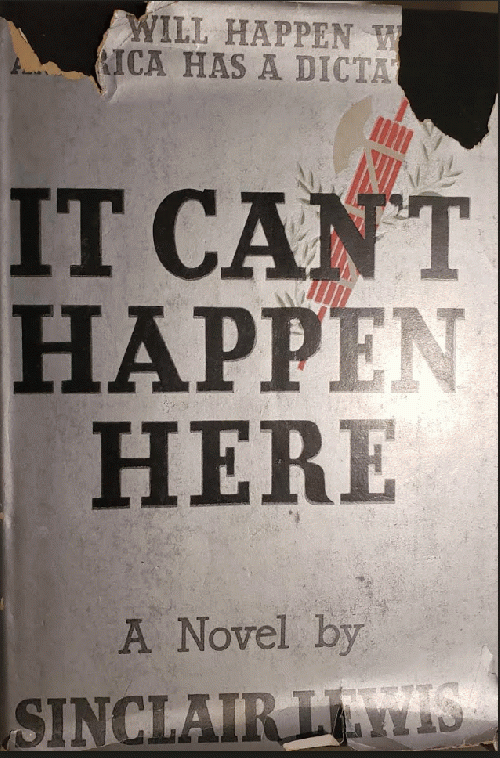Reprinted from www.counterpunch.org
In the 2001-2003 period, I was the first person anywhere to consistently apply the framework of fascism to try to understand unfolding events. Some among the commentariat dumped on me for using the term when clearly, according to them, we were in no such condition.
In those years the publisher of a well-known progressive press responded to my proposal for a book on emergent fascism by wanting me to interrogate--in person, in their own lairs no less!--John Ashcroft, Viet Dinh, Donald Rumsfeld, and other leading Bush administration figures at the forefront of introducing fascism. The standard for veterans of the progressive press turned out to be considerably less rigorous; they continued their armchair reporting, using the same discredited old framework. The publisher's absolute condition for the book was that I must not, under any circumstances, use the term "fascism"--I could call it anything else, just not that; presumably it would upset armchair revolutionaries.
Naomi Wolf--always quick on the mark, she, as in recently discovering The Vagina--wrote several years after the fact a book called The End of America: Letter of Warning to a Young Patriot (2007), in which she listed the major symptoms of the fascist tendency, borrowed particularly from the Nazi model, elements of which I too had applied earlier in the decade. The problem is, Nazism is not as universal a model as Italian fascism, so the standards are too narrow. By the time Wolf wrote, fascism in America had shifted to an insidious corruption of bureaucratic institutions. It was evident that tanks weren't going to march on the streets, and there wasn't going to be a violent militia to enforce fascism. So Wolfe's work was too little, too late, and in fact counterproductive because it distracted from the actual threat.
Immediately after 9/11, when I started using the surprising vocabulary to explain events, I was repeatedly admonished to qualify that it wasn't classical fascism I was talking about--that scared the hell out of everyone! It was a form of corporatism, perhaps, or friendly fascism, as many advised me, anything but the associations recalled by the classical form. Late in the decade, Sheldon Wolin came to the help of yes-but sympathizers when he offered, in what I think is an unsustainable convolution, the idea of "inverted totalitarianism"--America was saved, it might be fascism, but it came from the people, which made it sting less than jackbooted thugs or out-of-control Gestapos.
I moved to Texas in the late 1990s at the height of Governor George W. Bush's popularity. To go straight from Cambridge, Massachusetts to Texas was a shock. I seemed to be living my life in a reverse movement toward authoritarianism, earlier having moved from the libertarian California of the 1970s and 1980s to New England, which seemed to me puritan and stiff enough. But I wasn't prepared for Texas. I detected then the beginnings of the police state. The poor and minorities were subjected to continuous low-level harassment, and surveillance and discipline were inescapable if you fell into the wrong classification. The right of the poor to be themselves and carry on with their eccentricities and foibles was being denied, having become a matter of crime and punishment. Neighborhoods were patrolled by vicious busybodies taking it upon themselves to monitor activities (a forerunner of Bush's Operation TIPS, and the Trayvon Martin incident), and the only way for a poor person to stay out of trouble was to maintain a low profile. This radically different way of self-disciplining was unlike anything I'd experienced on the West Coast. Today when I travel to more relaxed southern states like Louisiana, or even Mississippi and Alabama, the contrast with authoritarian Texas remains shocking.
It was possible to remain in some form of denial even after the Gingrich Revolution of 1994. One could compartmentalize politics from personal life, act as if the calamity was far in the distance. The Clinton impeachment upended the false equilibrium for me. The effortless orchestration of media hysteria heralded for me the possibilities of totalitarianism, and I began to get very worried. Reality was being severed from perception. It was becoming clear that latent anxieties could be mobilized by a demagogue for nefarious purposes. It only remained necessary for a ruthless leader to show up and monopolize the instruments of manipulation for purposes other than the carefree market worship of the Clinton years.
Such a leader showed up right on schedule. The moment I heard nasty nasal-voiced Amazonian Karen Hughes advocating for "the guv'nor" on Meet the Press in mid-1999, I was convinced that the next President was perched in Austin at that moment and predicted that he would start a war in Iraq in 2003 (I didn't predict the terrorist attacks, although the steady drumbeat of terrorism anxiety in the media should have been a red flag). I told everyone who listened that America would not survive four years of George W. Bush. I was never in any doubt about the outcome of the 2000 election (or even 2004, when many liberals felt that John Kerry had a chance). When Bush was declared president in 2000 it felt apocalyptic, and I used that language in notes I took on election night. Remember that protestors were livid at Bush's first inauguration, pelting his motorcade and disrespecting him as the illegitimate thief he actually was. African Americans in particular were enraged at the outcome; their instincts were right. The ground had shifted, and a new powerlessness was legitimized. The Texas model was being nationalized.
Fascism always comes into play when certain elites are threatened by erosion of power. Versions of fascism were the preferred means of holding on to illegitimate privilege throughout the twentieth century. This mode is convenient because of the rise of mass media, which blend so well with the psychology of fascism, as opposed to different forms of monarchy and dictatorship before the twentieth century.
So we have to ask which elites started feeling threatened in the late 1990s, what was the source of their anxiety, and how did they propose to quell these anxieties and push the populace toward a new form of political imagination.
My proposition is this: Fascism (in its current form) is the result of social dislocations caused by the present stage of globalization, manifested most strongly in the most globalized nation, the U.S. Social anxiety is being redirected to global militarist aspirations rather than idealization of a humane economic system.
My own understanding of fascism has continuously evolved, as I examine the historical cases in more depth, as my frame of reference changes, and as events impose themselves. Early on, like most people, I relied on the Nazi model, since that seems to be the commonest recourse for analysis. In those early days I was writing a novel--I'm glad it never got published!--whose lead character, while sitting in jail, composes an essay on the relevance of Nazism to contemporary events. I later cannibalized that section (there was also one on witchcraft) and got it published, when I gave up on the novel.
The Nazi case is obviously the most extreme one, but Italian fascism is actually a more relevant comparison, because of the bumbling, hesitant nature of what transpired in the decade following September 11, and in the studied incompleteness of the American project. I've been studying fascism thoroughly again, in preparation for a novel about Italy in the mid-1930s, at the peak of Mussolini's power. This time I hope to reverse my earlier luck, by setting out some essayistic thoughts beforehand and having the novel published later.
Recall that the defining event in politics preceding the 2000 election was the Seattle riots, the anti-WTO, anti-globalization movement that rocked the establishment and forced Bill Clinton to start making concessions to protestors. It looked like the globalization agenda was up in the air, after relentless forward movement in the 1990s.
(Note: You can view every article as one long page if you sign up as an Advocate Member, or higher).





